You can tell an epic story at any length; sometimes a standalone fantasy can traverse just as much narrative space as an entire trilogy. But when it comes to fantasy worlds that we can explore every inch of, we are particularly fond of series with nine books or more. Yep, you heard us: we want trilogies upon trilogies (with the occasional side duology/quartet) in our favorite long-running SFF series. From alternate histories to fantasy that slowly becomes science fiction, from lady knights to more than a few telepathic dragons, from sagas that span one generation to multiple centuries, these series are so expansive and immersive that reading them feels not just like visiting a new world, but like coming home.
Tortall
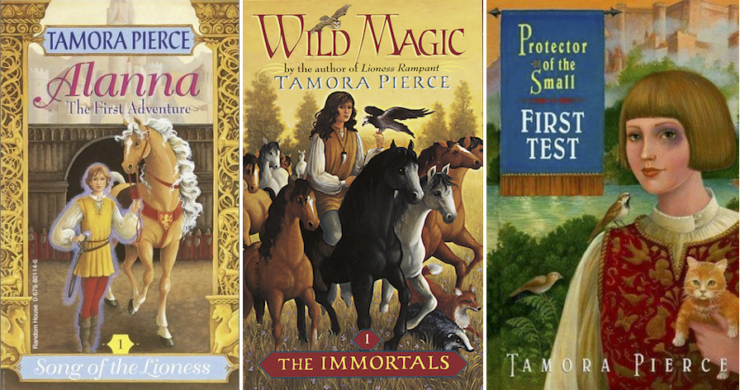
At the start of Tamora Pierce’s Song of the Lioness series, it’s been nearly a century since the kingdom of Tortall has seen a lady knight. Within 25 years, it will have two: Alanna of Trebond, the aforementioned Lioness, who disguises herself as a boy to get her shield; and Keladry of Mindelan, the Protector of the Small, the first girl to openly train as a knight, and shoulder her own burdens for doing so. Between those two quartets is a third series, The Immortals, chronicling Tortall’s battles with ancient creatures like Stormwings and goddess of chaos Uusoae. Humans struggle to maintain balance between the mortal world and the Realms of the Gods, led by shapeshifting wild mage Daine Sarrasri. Bookending these quartets are the prequel trilogy Beka Cooper: A Tortall Legend and the Tricksters Duology, about Alanna’s spy daughter Aly. While you could start chronologically, we recommend beginning your adventure when Alanna does.
Buy the Book


Alanna: The First Adventure
The Wheel of Time
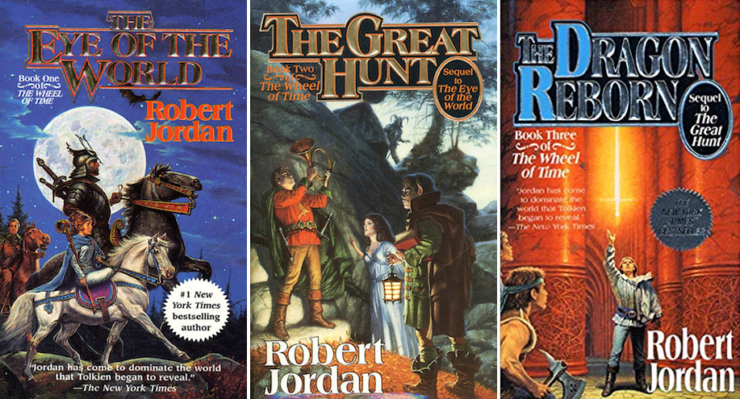
In The Eye of the World, Robert Jordan introduces us to his unnamed world in steps, starting with the relatively narrow viewpoint of Rand al’Thor. A farmer’s son from the backwater area of Two Rivers, he has little need to know much about the lands beyond his family’s own fields, and especially not about those realms’ conflicts and intrigues. Until, of course, the conflict comes to his home in the form of a Trolloc attack, which in turn has Rand and his friends joining up with the Lady Moiraine of the Aes Sedai on an epic journey. The readers’ world expands alongside Rand’s over the course of the 14-book series (plus one prequel story for good measure). And just as the Wheel of Time keeps turning, so too does the Wheel of Time (re)read—join in on the current first read here.
Buy the Book


The Eye of the World
Discworld
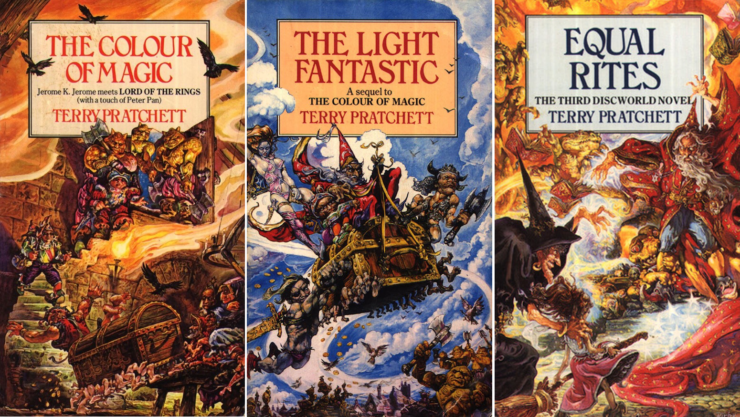
While many fantasy authors map their magical lands onto what is still ostensibly an Earth-like planet, Sir Terry Pratchett went above and beyond with his particular worldbuilding. Discworld is, as it says on the tin, a disc-shaped world—carried on the backs of four elephants that in turn stand upon the shell of an ancient space turtle moving slowly through the cosmos. Within this world (roughly the size of our Pacific Ocean), are myriad continents and nations and prominent cities like Ankh-Morpork within which dragons and gods and witches and golems all coexist. Over the course of forty-odd novels, readers get the chance to discover every nook and cranny of Pratchett’s comical fantasy world.
Buy the Book


The Colour of Magic
Dragonriders of Pern
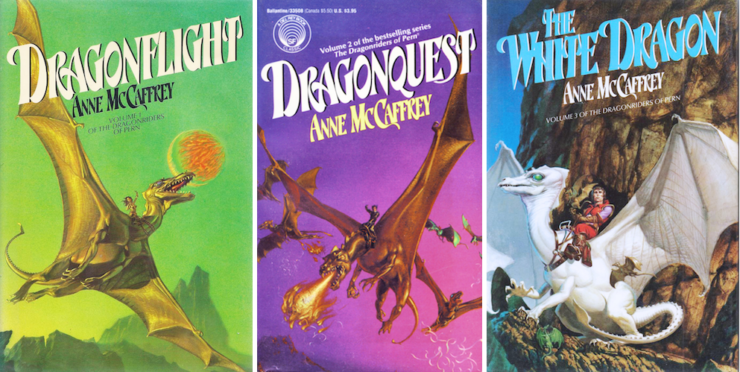
Weyr Search, the novella that would eventually become part of the novel Dragonflight, depicts a pulpy fantasy realm of dragons and dragonriders, ominous stars and fateful duels… but by the time that Anne McCaffrey was expanding the world of Pern, she found herself less interested in writing fantasy and more drawn to science fiction. So, instead of dropping the series, she made it sci-fi: the fantasy realm is the far-off planet of Rukbat 3, colonized by Earthlings and renamed for its initial evaluation as “Parallel Earth, Resources Negligible.” Except there’s one resource that came very much in handy: those dragons, or genetically-engineered fire lizards, which are the only thing that can face off against the all-consuming alien force of the Thread. Part of the fun of immersing oneself in Pern, as Mari Ness covers in her reread, is watching the shifts not only in Pern’s culture over just a few decades of story, but in the evolution of the series itself.
Buy the Book


Dragonflight
The Saga of Recluce
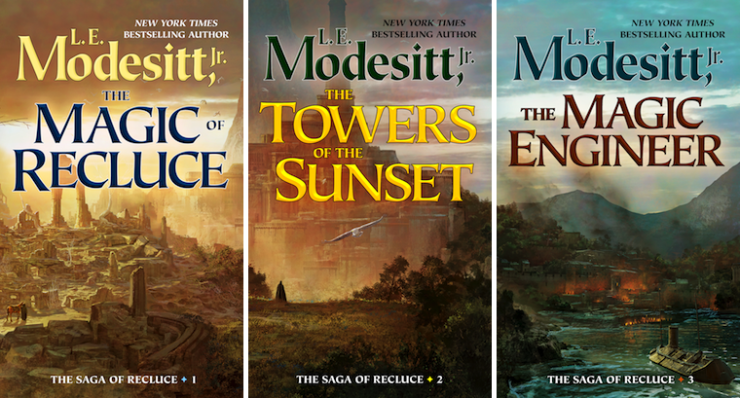
If you can believe it, while writing The Magic of Recluce, L.E. Modesitt, Jr. did not set out to write a second book, let alone a twentieth. His primary intent in penning that first book thirty years ago was to present a realistic fantasy—that is, a world whose inhabitants were more concerned with their day jobs than in mythical quests, and whatever magic (chaotic or ordered) they possessed was just one of several tools for survival. These more everyday applications of magic have also shaped government structures in Recluce itself and the lands beyond, from rule by traders’ councils to chaos wizards to military matriarchies. And when those different ways of life clash, well, there’s your conflict—not to mention the ongoing push-and-pull between order and chaos. Modesitt established enough of the foundations in The Magic of Recluce that it gave him enough material to generate new stories for decades—and he’s not done yet.
Buy the Book


The Magic of Recluce
Realm of the Elderlings
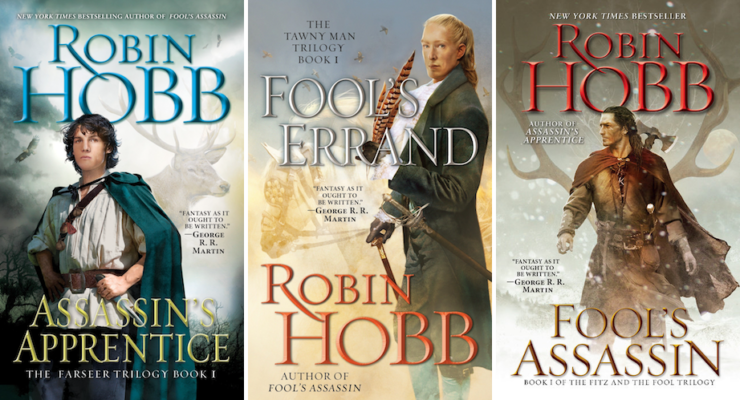
While the five series contained within Robin Hobb’s epic fantasy saga travel all over the eponymous realm, moving forward chronologically and switching perspectives among a variety of characters, it always comes back to FitzChivalry Farseer. Starting with the Farseer trilogy, every other series returns to the viewpoint of this royal-bastard-turned-assassin-in-training and his strange, seemingly destined, relationship to the Fool. The latter wears many faces over the intervening series, but the most recent set of books, the appropriately-named Fitz and the Fool trilogy, proves that these two have more to learn about what binds them.
Buy the Book


Assassin's Apprentice
Malazan Book of the Fallen
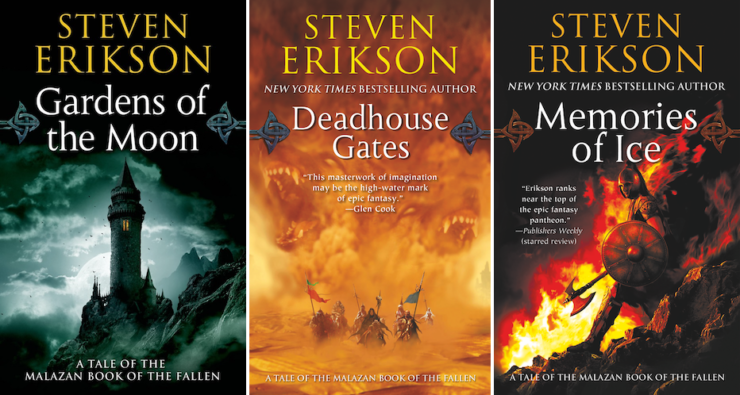
The most likely of all these worlds to get truly lost in, Steven Erikson’s high fantasy world can feel very sink-or-swim to new readers—especially the first novel, Gardens of the Moon, widely regarded as one of those books that takes multiple tries to get into. However, any diehard Malazan fan will tell you, if you can adjust to the in media res beginning of the series, you will be rewarded with centuries’ worth of payoff across the original 10 books, not to mention immersive, epic stories in Ian C. Esslemont’s novels set in the same universe. But it doesn’t have to be all or nothing, as Joel Minty puts it best: “the series goes as deep as you want it to go.” You can reread every book until you’ve caught every subtle hint, or you can have an occasionally bewildering or even overwhelming read if it means that you are letting yourself get fully caught up in the experience.
Buy the Book


Gardens of the Moon
Terre d’Ange (and Beyond)
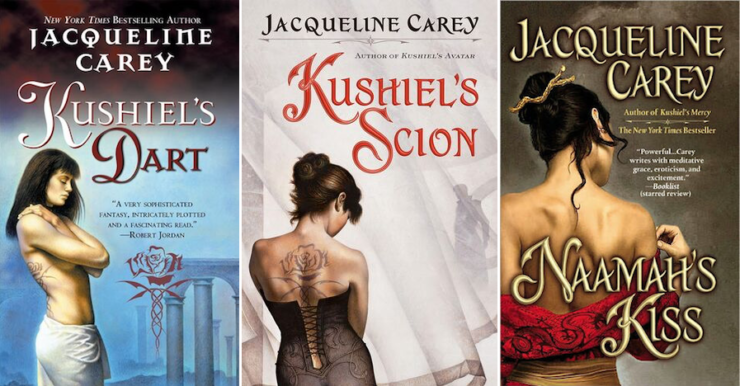
By the end of Jacqueline Carey’s Kushiel’s Legacy trilogy, loosely framed as the memoirs of Phèdre nó Delaunay de Montrève, the courtesan-spy-turned-noble has played integral roles in the game of thrones and grappled with omnipotent angels and treacherous humans. While readers no doubt would listen raptly to the rest of Phèdre’s lifetime, instead the focus shifts for the Imriel trilogy to that of her foster son, exploring his dark birthright beyond the borders of Terre d’Ange. Like Tamora Pierce’s Tortall series, each trilogy reveals the changing attitudes and power structures of this great land—and then we jump forward a century and across the water, to Alba and the Maghuin Dhonn. While these great magicians’ bloodlines have intersected with Terre d’Ange’s in the past, in the Moirin trilogy we get the reverse perspective. In a time in which Phèdre is a legend, Moirin journeys south to discover her D’Angeline heritage and restore the Maghuin Dhonn to their former greatness.
Buy the Book


Kushiel's Dart
The Sandman
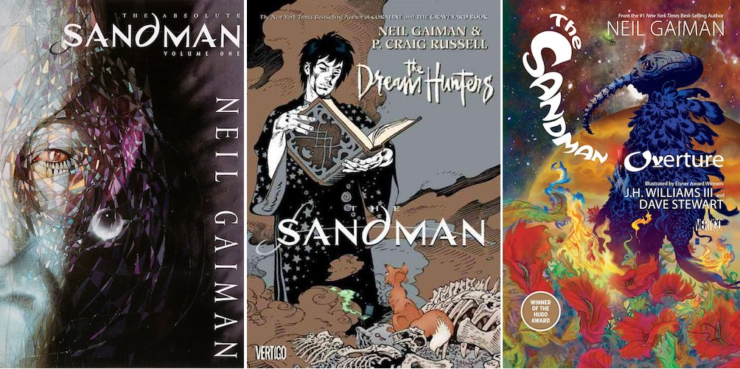
The original ten trade paperbacks of Vertigo Comics’ The Sandman collect 75 issues’ worth of story from Neil Gaiman and art from Sam Kieth, Mike Dringenberg, Dave McKean, and more, spanning a handful of worlds. There’s the Dreaming, Morpheus’ domain full of prisoners and rogue dreams. However, part of the Lord of the Dreaming’s power is to pass into the waking world as well, where he must grapple with nightmarish serial killers and a “dream vortex” that threatens the existence of his kingdom. Other issues flit, like jumping sheep, from Asgard to Hell to Faerie, to the other realms ruled by Dream’s siblings Death, Delirium, and the rest of the Endless. And if that’s not enough, the six-part Sandman: Overtures series loops back to the beginning, revealing how Morpheus began the series as a prisoner himself.
Buy the Book


The Sandman Vol. 1
Temeraire
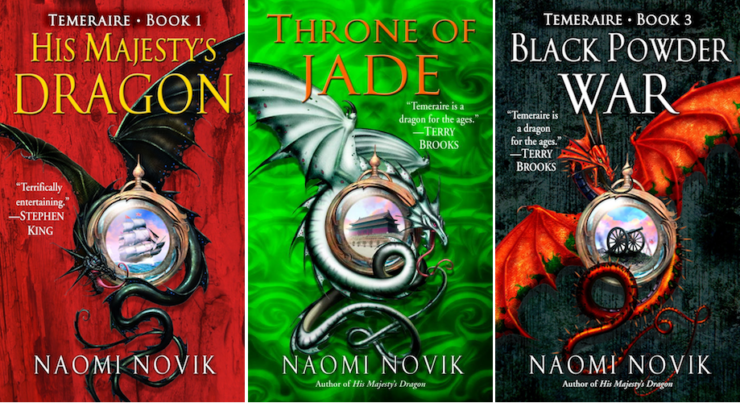
While the first trilogy within Naomi Novik’s alternate history focuses on the Napoleonic Wars, and how a British Royal Navy captain’s bond with a Chinese dragon turns the tide, the latter six books in the series move beyond the scope of one war. William Laurence and Temeraire’s adventures take them across the globe from China to Scotland, Australia to South America to Russia, as they seek a cure for a draconic disease while fixing diplomatic blunders and otherwise doing their part to maintain human/dragon relations. It’s a rare treat to take in an alternate history that moves beyond the borders of one country to show the cultural and historical shifts on a global scale.
Buy the Book


His Majesty's Dragon
What are your favorite long-running SFF series?










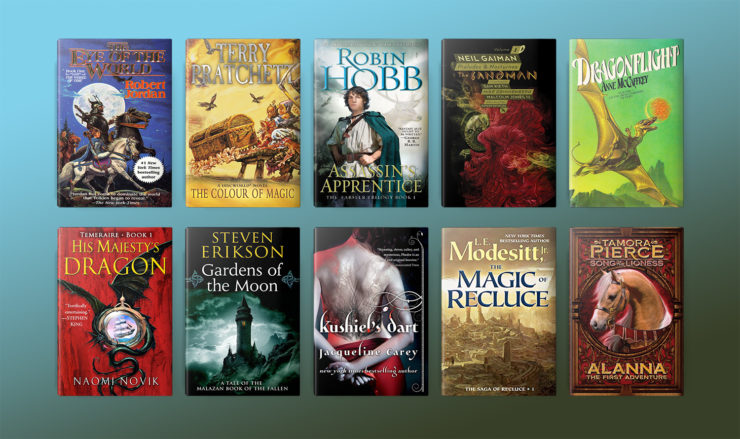
I’m a rabid fan of the Chronicles of Elantra by Michelle Sagara.
Brandon Sanderson’s Cosmere is the obvious one here. But for such a short page count (relatively), Glen Cook’s The Black Company provides a world rich for the imagination—and his penchant for only describing elements pertinent to the Company’s current objective means we get lots of teasers and hints at a crazy, rich world waiting in the wings.
I would include Fritz Leiber’s Lankhmer and Michael Swanwick’ Iron Dragon world.
Could never get through Robert Jordan’s tedious novels. Can’t understand their popularity.
Currently reading the Witcher series, so I’d throw that in.
I would include two series by Anne Bishop: The Black Jewels series and The Others series. Very different from each other, but both so very good.
Lee and Miller’s Liad books are another series to fall deeply into. Then there’s Buchold’s Vorkosiverse, Christopher Rowley’s Bazel Broketail books, and David Weber’s Honor Harrington. There’s also James S.A. Corey’s The Expanse which I completely fail to appreciate, but understand many other people like.
@3: Jordan’s books lost me at the point where he switched to dragging the story out for as many books as possible. The author I can’t get into is Robin Hobb. All the characters come across as too whiny for me to feel sympathy for them.
Wish I could immerse myself in the stunning world of Terre d’Ange for the first time again! One of the best surprises ever and still favorite books ever, as I had never heard of it before picking it to read in a comfy (independent!) bookstore armchair for a few minutes. Walked out of there at the closing, dazed and delighted, with a new book in my hand, that I could barely afford at the time. Worth it many times over.
Also loved Melanie Rawn’s Glass Thorns series set around a magical theater troupe. Wonderfully inventive!
Temerant and world of Four Corners in The Kingkiller Chronicle by Patrick Rothfuss currently has me unable to stop reading the first two books in the trilogy over and over again. About to start my 10th re-read.
Plus one for the Cosmere (especially Roshar) and Four Corners. Also, a very obvious one, but can it get more expansive than Middle-Earth?
For the first time this site gave me book recomendations that I actually already read or am reading. Normally you people give more spotlight to unknown works (to me) in these features.
I’ve been spoiled by the late, great Joel Rosenberg on this matter. When determining if/when to visit a fantasy world; first question has to be “What is the state of medical science?”. Do you really want to be on this world when you need a root canal? No healing clerics for the commons; no visits is my first rule.
Brust – Vlad Taltos series – magnificent and immersive in its 15 or so books. I’m a Loial fan.
Bujold – Vorkosigan – enough said.
Also need some love for Cherryh, especially the Foreigner series. About to reach the 20th book (yikes).
@12 another vote for Cherryh’s Foreigner series!
Me, I’d add Cherryh’s Union/Alliance books, especially given the recent publication of Alliance Rising, the first new book in the series in something over a decade.
P.C Hodgell’s Kencyrath series (beginning with God Stalk) has hit the 8 book mark (and really deserves to be more widely known).
Bujold’s World of the Five Gods and the World of the Sharing Knife are also good places to hang out in.
Pern was the first place I ever wanted to stay. As a pre-teen, I had dreams of Impressing my own dragon. I love seeing the love for Tere D’Ange as well.
I second the Dark Jewels series and of course the Cosmere *gives Bridge 4 salute*.
I have spent many a happy hour exploring Mercedes Lackey’s Valedamar series.
Sanderson is the best. Only GRR Martin is as good at pure storytelling. Martin’s English is superior. But, Sanderson won’t grime you up with all the rapey/incesty stuff that Martin loves to revel in. Elantris, Mistborn, Stormlight Archive all need movies now! Even his teen-focused stuff is pretty awesome.
Would also love to see some RA Salvatore. Drizzt. Jarlaxl. Artemis Entreri. Grand Master Kane. He’s got some great characters.
Also, its a crime the Myst Reader never became movies. Unfortunately Myst and Riven are prob too outdated to stir interest nowadays.
@17
Regarding Myst:
https://io9.gizmodo.com/myst-is-being-developed-for-film-and-tv-again-1835879416
The world that has always fired my imagination from the very first is Roger Zelazny”s Amber.
More yay! For Cherryh’s Foreigner series. Grew up on Pern (there are fire lizards all over my house). And always, forever, Middle Earth.
Not sure I’m ready for The Expanse, but I’m fascinated by it.
Terramar, that is, Earthsea…
Lynn Flewelling’s Nightrunners series. 8 books and, I hope, counting. Why no one has thought of picking this up as a peak-TV series is beyond my tiny brain’s capacity to figure out.
Oh wait! Seregil and Alec, both men, fall in love with each other at the end of book two. Never mind, mystery solved.
@3 – Fafhrd and the Gray Mouser! Yes!
@19 – Why hasn’t anything been done with Amber?!?
I would add Eddings’ world here, not that I recall it having a specific name…
excellent post
@12… second brust’s vlad series…love it!!
@19 & 23… hell yea!!! we need an amber series!!!!!! :D
i also gonna say janny wurt’s war of light & shadow…. she’s one of my fave authors
I’ll toss a vote out there for David Gemmell’s Drenai Series.
I usually like my characters to be morally grey instead of basic black/white but Gemmell has a way of making you really root for the good guy/girl.
Druss, in particular, is just such a likable character, especially after they introduce you to Sieben.
My first thought here was the Allianz/Union series by C.J. Cherryh and especially the linked Chanur/Compact books but those were already mentioned. So I want to throw in Georg R.R. Martin’s Wild Card books (well, at least edited by him). Great stories and in my opinion excellent world building. I would of course also mention his Fire & Ice series, but it does unfortunately not fit into this topic here because.he.did.not.write.enough.books.
+1 for Brandon Sanderson. I also vote for Potterworld and Asimov’s Foundation. Also, no one for Middle Earth?
I guess everybody figures Middle Earth goes without saying. Personally I have over the decades gotten lost on Darkover and in Kurtz’s Eleven Kingdoms. In the Dune-verse and the splinter cultures of The Dorsai Series, neither of which I fully understand after reading over and over again.
@29 — My dream, after watching Wolf Hall, was to see a Deryni series with Camber of Culdi played by Mark Rylance.
It’s really damned hypocritical of Tor, a site which presents itself as being very geared towards inclusivity and diversity, to recommend the bloody Pern series, which is both absolutely laden with misogyny and is written by a woman who once said that having anal intercourse caused permanent biological changes which made men gay.
Shame on you.
What about Doyle & MacDonald’s Mageworld?
viriconium anyone ??
If you’re gonna include Sandman, you gotta include Swamp Thing, which started it all.
The universes of Dune and Foundation deserve mention as well. Also Simmons’ Hyperion.
Agree with the nominations of Kurtz’s Deryni series and Cherryh’s Alliance/Union, and would add the Foreigner series – whenever I have a long plane ride I will pull any one of the Foreigner books off the shelf because I know I can get lost in it for hours.
Give me Earthsea any day.
And if we’re talking specifically about worlds, Barsoom (from Edgar Rice Burroughs’ Mars books) is way, way towards the top of my list.
Joe Abercrombie must have 9 novels now?
Iain M Banks The Culture.
Julian May The Many Coloured Land.
Robert Reed The Great Ship.
There aren’t enough books in the series, but Martha Wells did SUCH a great job of fleshing out the Three Worlds in the Books of the Raksura. She’s said that she’s done telling the stories of the Raksura, but there’s so much of the Three Worlds left to explore that I hope she returns there someday.
Jim Butcher’s The Dresden Files – 15 Books with assorted short stories and a 16th book to be released soon after a 5 year wait…
Katherine Kerr’s Deverry Cycle is up to 15 books with another due to be released in Feb 2020 after a long hiatus.
The universes that R.S. Belcher has created in his Golgotha and the Nightwise/Brotherhood of the Road series are some of my favorite expansive worlds.
Max Gladstone’s Craft Sequence is another one I would want to explore more.
Finally any of the worlds created by Robert Jackson Bennett.
Michael Moorcock The Cornelius Family.
Christelle Dabos The Mirror Visitor.
Elizabeth Bear The Eternal Sky.
If we’re looking for big old RPG-able worlds, Silverberg’s Majipoor probably counts.
I think the expression ‘RPG-able’ I just coined, is the crux here. A lot of worlds in a lot of stories are means to an end; the world is built around the story. We’re talking about worlds you could lose yourself in without caring about the heroes and villains of the stories that spawned them. The more real, less apocalyptic worlds.
Well-realised worlds that service a story (such as the four main worlds of Gene Wolfe’s Solar Cycle) can come very close. But at the end of the day, there is a didactic element to their fundamental physics. They aren’t worlds just made to be WORLDS.
For me there are only two worlds where I would get lost in…
The Blake’s 7 novels by Trevor Hoyle, and the English translations of the German series Perry Rhodan. Blake’s 7 is much more contempory, while Perry Rhodan is much more like the classic Skylark series of books.
Bothare worlds where I could get lost in. Although I prefer Blake’s 7 myself, they are novdlisations of the TV series. Perry Rhodan has never been seen on TV or cinema to the best of my knowledge. But there is something about them that is reminiscent of the old Republic serials as well as the Skylark series of books.
Cant believe there is no mention of Raymond Feists’, Magician, and basically the world of Midkema!
i miss patricia kennealy-morrison (keltaid cyclus), stephenson donaldson (the chronicles of thomas covenant, the unbeliever, brilliant after my opinion), david and leigh eddings (belgaria-saga and others) and margaret weis & tracy hickman (the death gate and others). i read all these in german, since my english is not good enough.
So I suppose MJ Sullivan’s Elan isn’t there yet, although both Riyria sets plus the First Empire might get you to nine. Elan is a rare experience like the Silmarillion, where you get to experience several Ages rather than a single one.
Nice to see Tamora Pierce’s books here!
A sadly little-known fantasy world is the late Louise Cooper’s Time Master universe.
Apart from the initial Time Master trilogy she wrote three more trilogies in the same setting totaling 12 books (13 if you count Lord of No Time which is an earlier incarnation of what became the Time Master trilogy).
@50: There is a Perry Rhodan film but it’s atrocious. Its English title (it’s an Italian production) apparently is Mission Stardust: https://www.imdb.com/title/tt0063859/
When K. H. Scheer, one of the original writers of the PR series (the head writer, in fact), who had not been involved in the screenplay visited the set in Italy he was appalled. :-p
Basically, the movie uses some basic ideas from the first four or so PR novellas but very quickly turns into a cheesy spy film. It deviates enormously from the source material and it’s no wonder that the movie is entirely forgotten outside of the PR fandom.
The only good thing about it is Emmy Persson, a gorgeous Swedish actress who is a pleasure to look at. And that’s about it!
And OMG, Pokemon!!! how could I forget???
@56 – THANK YOU!! Incredibly only yesterday I caught the end of a reference to the PR film. I missed the start, so I had no idea what it was called, I just saw something that looked like one of those bad Italian westerns..but they repeated his name again as Perry Rhodan! I wondered on the chances of them using the same name, because I could not be sure it was meant to be that PR! Now I know what it is called, I am going to try and find it. I guess it is not going to be very good, but I am still delighted as there seems to be so little PR stuff available (at least outside of Germany?).
I am just please that there are still PR fans, I loved the books, as I was lucky enough to get the American editions remaindered for just 25p each from Sci-Fi bookshops. The British ones I ended up buying them at full price I think? Again from a Sci-Fi bookshop (Dark they were and Golden eyed, Ltd.). Thank you for telling me.